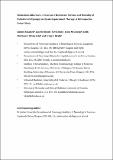Medication adherence, utilisation of healthcare services and mortality of patients with epilepsy on opiate replacement therapy : a retrospective cohort study
Abstract
Introduction: Substance misuse is not uncommonly recognized in people with epilepsy (PWE). Mortality is significantly greater in those with comorbid substance misuse, but it remains unclear whether epilepsy care and management contribute to this. This cohort study aimed to compare the rates of mortality in PWE receiving opiate replacement therapy (ORT) and PWE alone, as well as evaluate their medication adherence, levels of engagement with epilepsy services as currently delivered, and utilization of unscheduled hospital care. Material and methods: A 5-year historical cohort for PWE was identified and manually validated using electronic patient records registered with NHS Tayside. Overall incidence rates for mortality and contact with emergency health care services were calculated for PWE receiving ORT and PWE alone. Engagement with outpatient epilepsy services was also noted. Adherence to antiepileptic drugs (AEDs) was expressed in terms of medication possession ratio (MPR). Results: Of the 1297 PWE attending a tertiary care epilepsy service, 68 (5.3%) PWE were receiving ORT. The mortality rate was significantly greater in PWE on ORT in comparison to PWE only (7.4% vs 1.7 %; P < 0.05; relative risk of death: 4.34, 95% CI 1.19–15.7), as well as the incidence of emergency healthcare services contact being higher (24.5% vs 17.7%; P < 0.05; incidence rate ratio: 1.39, 95% CI: 1.12–1.71). Poor adherence to AEDs was also more common in PWE on ORT (28.4% vs 23.5%; P = 0.02), as well as failure to engage with elective outpatient services (8.4% vs 3.0%; P < 0.05; rate ratio 2.77, 95% CI: 1.86–4.1). Conclusion: People with epilepsy on ORT are less likely to engage with elective epilepsy services as currently delivered or take AEDs as prescribed despite most of these patients having daily attendance at a community pharmacist. This may contribute to the significantly increased rates of mortality and unscheduled hospital care. Clinicians and policymakers should consider service redesign to meet the demands of this high-risk population in an attempt to reduce mortality and morbidity
Citation
Askarieh , A , Morrison , I , Ross , K , McCowan , C , Matthews , K , Kidd , B & Heath , C A 2021 , ' Medication adherence, utilisation of healthcare services and mortality of patients with epilepsy on opiate replacement therapy : a retrospective cohort study ' , Epilepsy & Behaviour , vol. 117 , 107829 . https://doi.org/10.1016/j.yebeh.2021.107829
Publication
Epilepsy & Behaviour
Status
Peer reviewed
ISSN
1525-5050Type
Journal article
Description
Funding: This research was supported by a grant from TENOVUS Scotland, a national charity supporting medical research and involved in the improvement of healthcare within Scotland, UK.Collections
Items in the St Andrews Research Repository are protected by copyright, with all rights reserved, unless otherwise indicated.

